Bundesliga Tactics Talk: Round 30
The latest edition - in addition to covering the latest league fixtures of Leverkusen and Bayern via draw-ups - also takes a look at the tactics of both teams in last week's European action. There's much to delve into ahead of the return to league action this weekend.
Leverkusen and Bayern are joined by Wolfsburg, Bochum, Bremen, Stuttgart, Köln, Frankfurt, Augsburg, Heidenheim, and Leipzig with their turns on the tactics boards this week. As the campaign's "crunch time" approaches, we're pleased to touch on all the nuance as always!
Bundesliga Tactical Banter: Round 30
More BMG misery
Borussia Mönchengladbach fans surely begin to question whether or not they're cursed at this point. The "mired in mediocrity" team absolutely no one wishes to discuss can't even win a match when one of their best players scores a hat-trick and earns "man-of-the-matchday" honors in all German press sources. Gladbach attacker Robin Hack collected three goals in Saturday's loss to Hoffenheim. In the end, a spectacular comeback from a 1-3 deficit and plenty of sparkling play from the likes of Hack, Alassane Plea, Stefan Lainer, and Joe Scally simply wasn't enough to gain any points at all.
On 31 points with four match-days remaining, there's even some talk that Gerardo Seoane's Fohlenelf might join the relegation race discussion. Upcoming opponents 1. FC Union Berlin and Werder Bremen should theoretically provide the needed three points to secure safety, but who can realistically know what to expect from a team that seems to specialize in screwing up whenever it counts? Failure to win either one of the next two fixtures does actually bring the relegation threat directly to the BMG. Victories against Eintracht and Stuttgart in the final two rounds don't seem likely.
Gladbach supporters might welcome a chance to avoid the drop as such an occurrence would at least provide them with something to sustain interest in. Germany's preeminent footballing publication likely rubbed some serious salt in the wounds of this club's fans by leading the Monday Kicker print edition with a disparaging story outlining how difficult the latest rebuilding process shall be. It's absolutely fair to question why there's even a "latest rebuilding process" in the first place. How many such "processes" must this club endure? This counts as the fifth one in five years.
Satisfactory mediocrity
As much as can be said about the 1-1 draw between Freiburg and Mainz in Sunday's capper, the draw counted as an advantageous result for both sides. The point gained finally lifts Bo Henriksen's Rheinhessen out of the relegation zone. The Nullfünfter may be only one point above the playoff place, but many positive trends point to the team eventually getting themselves out of the drop zone permanently. Anthony Caci continues to thrive in his makeshift right-wingback role. The Frenchman garnered an assist on Jonathan Burkardt's (himself a great story) goal.
Beyond Burkardt and Caci, there's also the sustained top form of midfielder Nadiem Amiri, defender Andreas Hanche-Olsen, and attacker Brajan Gruda to consider. Mainz might have even eked out a narrow victory were it not for a double error from defender Dominik Kohr and keeper Robin Zentner. Apart from that one slip up, Kohr and Zentner largely played well. Those following the "Mainzer suspension saga" don't meet the news that Tom Krauß and Jae-Sung Lee caught their fifth yellow cards with much concern. Silvan Widmer and Karim Onisiwo can fill in against Köln next week just fine.
Freiburg fans dissatisfied with the fact that their team have now gone six home league fixtures without a win made their discontent known with boos and whistles on Sunday evening. The behavior - responded to in kind by SCF gaffer Christian Streich - was both unbecoming and uncalled for. The Breisgauer may not have won a league fixture at home since match-day 18, but the draw against Bayern and the big UEL win against Lens should count for something. Moreover - based on the remaining schedule - Freiburg should be considered favorites to clinch the second UEL place this year.
Fans from both sides should be optimistic.
The "Spiegel Specials": Round 30
Wolfsburg-Bochum (1:3, 1:0)
The first of our "Spiegel Specials" takes a look at what unquestionably constituted the most optically poor fixtures of the weekend. Wolfsburg's narrow win over relegation rivals VfL Bochum may have served as one of the rounds most significant results, but there's simply no way of disguising that covering it wasn't easy on the eyeballs. Ralph Hasenhüttl's northern Autstädter just barely got the job done against a disorganized rabble of a team bearing almost no resemblance to the side that held such integrity in the Hin-runde.
Via two personnel changes outside of defense, Hasenhüttl maintained loose adherence to the 3-4-3 he deployed last week.Jonas Wind and Tiago Tomas replaced Kevin Behrens and Amin Sarr in attack. The top axis tightened up considerably. Ridle Baku worked as high and tight as he ever has in his career. Aster Vranckx also moved ahead of Maximilian Arnold in a re-ordering of the previous midfield arrangement. Germany's green company team lined up in a constellation that looked more menacing on paper.
Lineup—WOB—Match 30 (3-4-3)
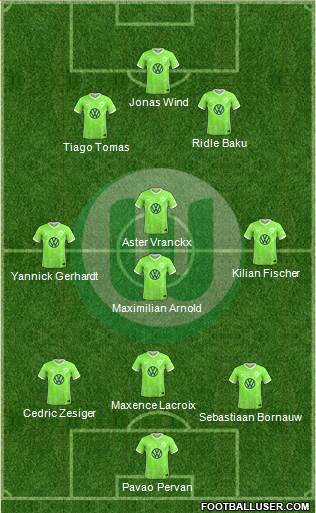
The archaic cliché of games not being won on paper unfortunately applies. Baku - one of Hasenhüttl's pet projects - appeared active early on. The four-times-capped German senior international registered the lone chance of a dominant enough opening quarter-of-an-hour from the German Wolves. After 15 minutes of nearly uninterrupted possession, the Lower Saxon hosts nevertheless lost the ability to maintain their shape. VfL interim trainer Heiko Butscher went with the same XI he deployed last week, wisely enough re-ordering the over-staggered 4-4-2 into a simpler 4-2-3-1.
Lineup—BOC—Match 30 (4-2-3-1)
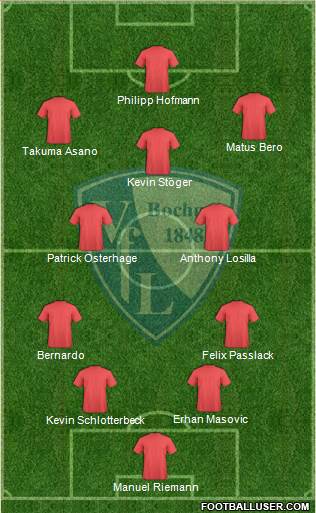
A half-time lead very much would have been in order for the Revierklub. Some decent combos up the left saw Takuma Asano and Patrick Osterhage get looks on goal in. Kevin Stöger was once again effective driving the approach play from the ten-slot and generated a chance of his own via a dead-ball service. There can be no real debate about Osterhage's 1-0 being disallowed for offside, but Butscher's men certainly deserved to be the team heading into the tunnel up a goal. Jonas Wind scored the opener that would count out of nowhere thanks to some careless disorder in the Bochum back-ranks.
A push of the panic button?
Butscher arguably behaved as reckless as the higher ups who appointed him when he brought on Christopher Antwi-Adjei for the highly effective Asano at the break. One immediately witnessed a reversion to last round's 4-4-2. For whatever it's worth, Antwi-Adjei and Matus Bero worked much higher than the wingers did against Heidenheim. Some more will and determination was discernible in the new set-up. No real notable scoring chances emerged, however, until Philipp Hofmann headed a Stöger cross on target in the 71st.
Lineup—BOC—46th minute (4-4-2)
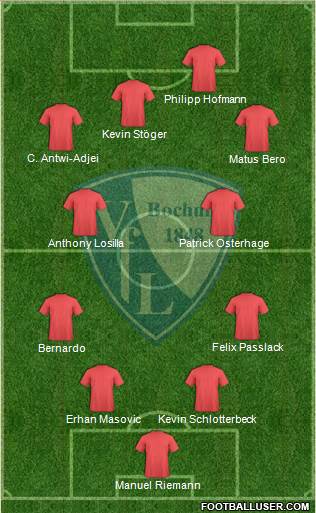
A third major tactical shift of the match came in the closing stages. The columnist needs to point out that an inexperienced trainer such as Butscher honestly has no real business masquerading as some sort of clever strategist with a collection of players he's barely acquainted with. Introductions of Maximilian Wittek, Lukas Dashner, and Moritz Broschinski yielded a 3-5-2 that had some potential, yet clearly hadn't been adequately drilled on the training pitch enough to be minimally competent. Woof. As the sections below shall reveal, there were many ugly 3-5-2s in the Bundesliga this weekend.
Lineup—BOC—82nd minute (3-5-2)
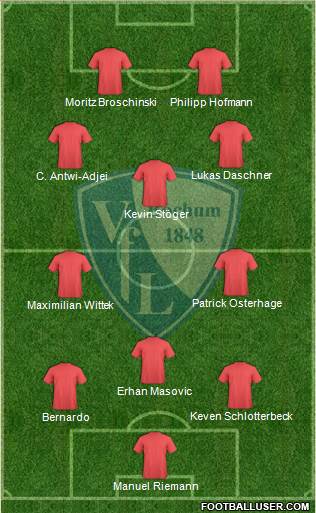
It makes sense at least. Erhan Masovic remains an excellent candidate to run a straight pivot. Osterhage's field vision can help out with long verticals out of the back. Butscher might even do well to consider moving Stöger back to Wittek's position and potentially allowing Asano to operate as the ten. With more practice, something like this could work. As it turned out on Saturday, only Wolfsburg produced further scoring opportunities down the stretch. Youngsters Kevin Paredes and Jakob Kaminski were somewhat unlucky not to make it 2-0.
Prognosis: Probably a "Befreiungsschlag"
At this point, it seems apt to bring up a German word making the press rounds during the current season's relegation race. "Befreiungschlag" literally translates to "liberating blow". To the author's knowledge there is no real English idiomatic equivalent. In any event, footballing table-hounds clearly understand the meaning. A team that - with a big win - gives itself something of a cushion from the relegation pack has completed a "Befreiungschlag". Wolfsburg have, arithmetically, accomplished just that with the three points earned here. Four points now separate the Wolves from 16th-placed Bochum.
Naturally, die Wölfe still need four more points before attaining the "magic number" generally considered necessary to ensure survival in the German top flight. Upcoming opponents Freiburg, Darmstadt, Bayern, and Mainz. To the dismay of most league watchers, that field will most likely yield it. An ugly win still counts at the end of the day. Wind's first league goal since (!!) match-day 12 counts as something of a "Befreiungschlag" as well. Perhaps there is an adequate English translation. Wolfsburg have "cleared some weight from their shoulders" or "gotten the monkey off their back".
One can also speak of "breathing space". Hasenhüttl's company club have it. Bochum - whom believe it or not were on 25 points after beating Bayern on match-day 22 - have missed no fewer than nine opportunities to deliver their own "Befreiungschlag". What a collapse this has been. Two points from nine league fixtures. The author does not exaggerate when he takes note of the fact that "Befreiungschlag" has been used in the context of reporting on Bochum just about every week. Over two months of "Bochum verpasst die 'Befreiungshschlag" headlines.
Ugh.
The 1848ers are simply done.
Bremen-Stuttgart (0:2, 2:1)
Huge upset in the Hanseatic city-state this weekend. Ole Werner's SV - not exactly known to be masters of home form this season - flipped the Hin-runde result against the Swabian league sensations and very nearly handed us one of those coveted "perfect mirrors". Hmm. What happened here? Bad luck for starters. Sebastian Hoeneß' Stuttgart did top Bremen xG-wise by nearly a 3:1 ratio. The Württembergers lorded over upwards of 70 percent possession in the first half. Deniz Undav and Serhou Guirassy produced enough chances to give the VfB a 4-0 half-time lead.
The team that saw its 11-match-unbeaten-run snapped ran into a hot keeper in the form of Bremen's Michael Zetterer. The goal-frame also came to Zetterer's aid on two occasions. By contrast, the team that snapped their seven-game-winless run were aided greatly by a penalty awarded to them while one not given on the other side robbed Stuttgart of a chance to equalize. Not the cleanest win from Bremen's perspective. Slumping Marvin Ducksch recorded a scorer's brace despite not playing a particularly good game.
All of this notwithstanding, the column will have to call out Hoeneß for making all the wrong moves tactically. An interesting sight to see Hoeneß correctly anticipate that Werner would deploy a 3-4-3 in order to compensate for the fact that Ducksch's form dip had much to do with the fact that there wasn't adequate support for the lead striker in the regular 3-5-2. Hoeneß earns some plaudits for roughly reading what Werner had in mind. It came as no surprise to watch Werder settle into this based on the team-sheet.
Lineup—SVW—Match 30 (3-4-3)
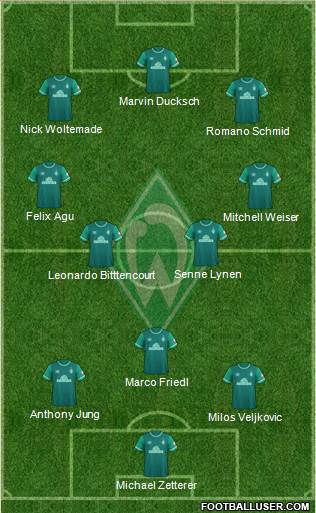
On the topic of team-sheets, the fact that Chris Führich was missing from Hoeneß' line-up initially caused some consternation. The newly capped German international hasn't missed a start across all comps this season. How exactly Stuttgart would settle with Enzo Millot filling in for Führich remained a mystery. All one could say for certain is that the regular 4-2-3-1 would not be in use. Working out Undav and Millot's positioning proved difficult. The graphic below serves as the columnist's best guess. If this was indeed the plan, Hoeneß seemed to be trying to emulate "late-match" Leverkusen.
Lineup—VfB—Match 30 (3-4-3)
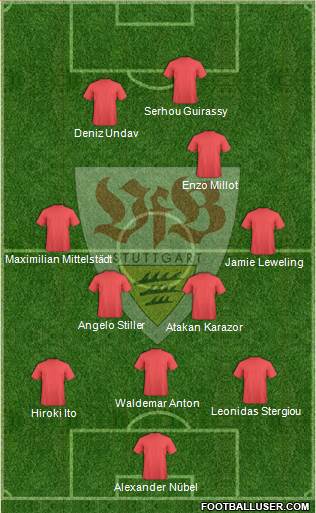
Undav put his fair share of time in on the wing, but mostly slid inward to function as Guirassy's service striker. Millot almost appeared not to know what his assignment was. The most important thing to keep in mind here concerns the fact that the use of Jamie Leweling as a wingback counted as an absolute failure on both sides of the ball. The Union Berlin loanee screwed up two offensive chances and blew numerous marks against Felix Agu before ultimately conceding the crucial penalty in the 28th. Both Leweling and the totally lost Millot incurred bookings.
Hoeneß quickly scrapped the experiment at half-time by introducing Führich for Millot and Pascal Stenzel for Leonidas Stergiou. The 4-2-3-1 returned. While attacking play (already quite decent) improved by leaps and bounds, Maximilian Mittelstädt never quite got his feet planted back in his regular left-back role. One of Stuttgart's other new national team stars usually moves forward, not backward, later on in matches. Mittelstädt wasn't in the proper position to mark Romano Schmid just prior to the Austrian's cross on Ducksch's 2-0 in the 49th.
Lineup—VfB—46th minute (4-2-3-1)
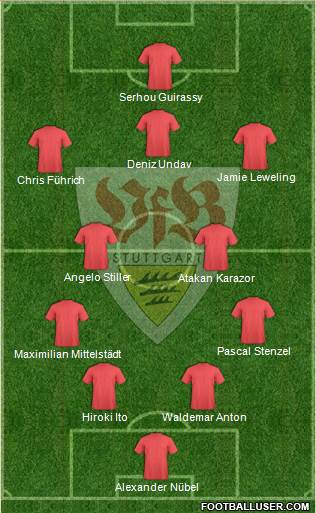
Werner also had an answer for this:
Lineup—SVW—46th minute (5-4-1)
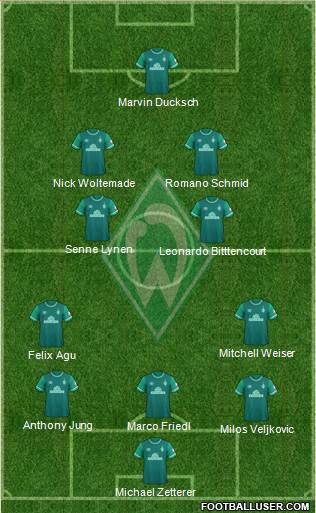
Switching a 3-4-3 into a deep-seated 5-4-1 always proves easy enough. A simple match-plan, some top-notch instances of passionate defending, and (of course) some more luck enabled the Hanseatic hosts to hold off a spirited Stuttgart comeback. The late play of Undav and Guirassy remained stellar. VfB subs Führich, Stenzel, and (later on) Silas was similarly superb. One point or even three could have easily been secured for the guests here. One nonetheless must dock Hoeneß for getting his tactics wrong from the outset. The VfB trainer undoubtedly cost his crew some big points.
Prognosis: Probably another "Befreiungsschlag"
Werder skipper Marco Friedl's general optimism about Bremen's place in the relegation race suddenly finds vindication. It becomes next to impossible to envision the Hanseaten failing to pick up one single point against upcoming opponents Augsburg, Gladbach, Leipzig, and Bochum. Even should the unthinkable occur, a end-of-season total of 34 points should probably prove sufficient to secure Bundesliga football next season. Bremen exit the relegation conversation on the same weekend regional rivals Hamburger SV drop out of the promotion race.
As pertains to Stuttgart's quest to secure a Champions' League berth, there's sudden cause for concern. Bayern and Leverkusen await over the next two weeks. The campaign's final two opponents, Augsburg and Gladbach, also look to have much to play for. It's actually not inconceivable that the BaWü wonders can slip out of the top-four race. A limp finish to the season might influence Hoeneß' decision to remain with the club. A treacherous "domino effect" threatens if the head-coach leaves. Many players are already rumored to be on the way out. Others will follow Hoeneß.
Uh-oh.
Now we've got problems.
Köln-Darmstadt (1:0, 0:2)
Before letting 1. FC Köln trainer Timo Schultz have it for his second consecutive week of appallingly poor tactical decisions, it's worth noting that the catastrophe befalling Germany's cathedral city side this past round wasn't as bad as the chants from the RheinEnergieStadion crowd might have suggested. The understandably upset Kölner ultras chastised their team for not fighting hard enough in the home loss against last-placed SV Darmstadt 98. Having had a chance to review things, the author didn't necessarily get the impression that the Effzeh weren't trying.
Köln retained a sizable advantage in both ground and aerial duels, pushing a 70 percent win-rate in the latter case. Schultz's Domstädter also strung together an 80 percent passing rate, out-possessed their guests roughly 60-40, outshot them 18-12, and outflanked them 26-8. The losing team certainly "fought" serviceably enough. Schultz had no real cause to berate the boys in the same manner he did a couple of weeks back. The latest loss stemmed from radically different sources. Er...perhaps it would have been appropriate for Schultz to berate himself.
Lineup—KOE—Match 30 (4-4-2)
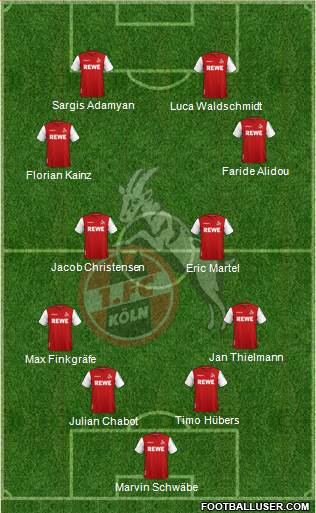
One can find little fault with the decision to start Luca Waldschmidt; something most league watchers had been calling for. The decision to stick with Jacob Christensen, on the other hand, completely backfired. For all the talking up of the young Dane, Denis Huseinbasic probably would have been the better choice to pair up with the returning Eric Martel. The team's build up play never really had a fluid feel about it with this double-six pairing in place. Attack charges were all to frequently forced out wide. Some useless muscle memory then yielded too many useless crosses into the box.
When the Geißböcke weren't punting in crosses to the ghost of Anthony Modeste, Darmstadt's high offside trap shut the relatively inexperienced trio of Max Finkgräfe, Jan Thielmann, and Faride Alidou down. Schultz attempted to remedy this by replacing Alidou with Linton Maina at the break and ordering more flank rotations between the sub and captain Florian Kainz. This only led to more confusion. Torsten Lieberknecht's offside trap cut off the hosts with just as much ease after the restart. After the Lilies grabbed the lead off a 57th-minute set-piece, Schultz had to employ changes.
The Effzeh gaffer took his time setting up a triple substitution after the initial Darmstadt goal. Huseinbasic, Steffen Tigges, and Benno Schmitz relieved Martel, Kainz, and Waldschmidt in the 67th. As bad as Christensen had been, Shultz didn't really have much of a choice but to yank the much worse Martel over the other half of his six partnership. A leveraged and risky back-three also proved necessitous. As is commonplace in football, the strongest center back needed to move forward in order to operate as a striker. Spotting the tactical error should prove easy enough in the graphic below.
Lineup—KOE—68th minute (3-5-2)
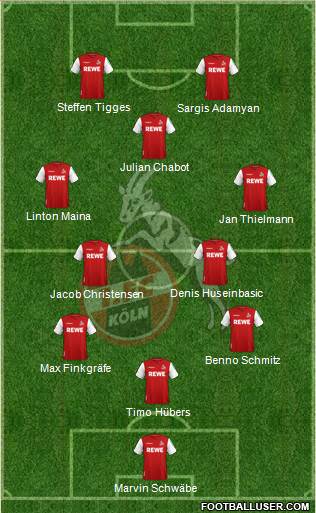
Wrong. Using Jeff Chabot as a deeper pocketed nine made no sense. All this would do - for lack of a better term - would be to create some needless "clusterf**kery". Chabot and Sargis Adamyan ended up obstructing one another on Köln's best chance to equalize in the 74th. General forward movement unfolded too slowly for the trailing side to piece together anything dangerous in the box. Overcrowded mediocrity all the way down the stretch. Darmstadt's second goal - cruel though it was off a dead ball - remained justified. There should be no more talk of renewing with Schultz after this.
Prognosis: The "Kölner" KO
Practically no one in German footballing circles accords this club much of a chance of surviving now. A relatively favorable final docket of Mainz, Freiburg, Union Berlin, and Heidenheim could yield up to six points. Regrettably, that still isn't anywhere good enough to get Köln up above the 30-point threshold, let alone get them within the 35-point range. Arithmetic doesn't allow for it. The transfer ban double dooms them. Without rebuilding prospects, relegation to the second division practically translates to the nether-regions of the 3. Liga.
German football must reckon with another "fallen giant". Schalke, Nürnberg, Hamburger SV, Hertha BSC, and Hannover 96 already languish in the 2. Bundesliga. Kaiserslautern and the Rostocker "Kogge" look to sink down to the level of the "K-club" we're presently discussing. So it goes sometimes. About the only thing one can add in closing concerns the fact that even the most frustrated German football fans continue to hold a hard line when it comes to the issue of outside investment. Kölner enthusiasts shall accept the coming hard times.
A financial "bail-out" remains out of the question.
The "Burning Question": Round 30
Will Frankfurt hold on for Europe?
Before getting to all of the (insane) possibilities associated with next year's revised Champions' League format, it's best to first address Friday night's big 3-1 win over Augsburg. Dino Toppmöller's RheinMain Adler undeniably rose to the occasion in knocking down their direct UEL competitors. Bundesliga watchers maintained an unfortunate feeling that the more popular and novel European contenders simply didn't have enough to knock the far more talented team off their perch. One can't say that the win was undeserved. The Hessen hosts played the better game.
Toppmöller's personnel woes weren't anywhere near as destabilizing as they were last week against Stuttgart. Ellyes Shkiri, Mario Götze, and Dina Ebimbe all returned from injury, sickness, and suspension. Hugo Ekitiké also built enough endurance fitness to lead the line from the start. A fairly competent 4-3-3 with a six-seven-eight step-stone in midfield crystallized shortly after kickoff. Eintracht - looking very solid in attack with Omar Marmoush slid back to the left - generated plenty of promising early chances before Ruben Vargas opened the scoring against the run-of-play.
Lineup—SGE—Match 30 (4-3-3)
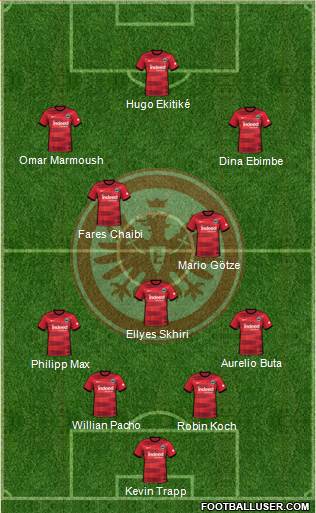
Unfazed by the early 0-1 deficit, the SGE offensive engine kept clicking. The returning Götze in particular functioned smoothly in his "bridge" tactical role. Ebimbe, Marmoush, Fares Chaibi, and Aurelio Buta all had cracks at an equalizer. Ebimbe, Buta, and Chaibi finally got it right on a very nice combo preceding the 1-1 ten minutes after the restart. Ekitiké netted the 2-1 (the Frenchmen's maiden Bundesliga goal) following some excellent set-up work from Marmoush six minutes later. Marmoush himself got a thoroughly earned goal on the 3-1 when FCA keeper Finn Dahmen was caught out of net at 90+5.
A general SGE assessment
Such a great match from attackers Ekitiké, Ebimbe, and Marmoush constitutes great news. A struggling trio receives a huge confidence boost. Götze genuinely contributed a great deal, even if he sometimes stumbled whenever moving up to function as more of an eight. The Frankfurt back-four worked as a cohesive enough unit. Robin Koch more than made up for his iffy performance last week with a couple of critical tackles. Upcoming opponents Bayern, Leverkusen, and Leipzig will obviously serve as a much harder test for the Koch-cpatain corps. For now, one can say that everyone was on the level to beat a subpar team.
Anything of interest from Augsburg?
FCA trainer Jess Thorup resorted to some desperate measures after Eintracht took the lead. One legitimate critique of Thorup remains the fact that the Fuggerstädter gaffer doesn't really have a "Plan B" beyond his regular 4-4-2 diamond. The introduction of defender Patric Pfeiffer for striker Philip Tietz in the 66th heralded the return of a sordid back-three many of us hoped we'd seen the last of. Pfeiffer, woefully underused thus far this season, ran the constellation from an inverted pivot. To the center back's credit, Pfeiffer did produce the best FCA chance of the rest of the match.
Lineup—FCA—66th minute (3-5-2)
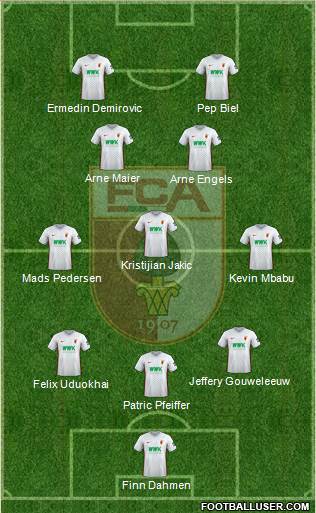
One still hopes this never appears again.
How crazy can the UCL race get?
Wildly so. One can easily drive oneself insane when it comes time to consider the potential six-team German Champions' League field. Provided set-finalists Dortmund capture the current Champions' League crown, Eintracht could actually be eligible for the sixth German UCL slot if Dortmund finish outside the top four. Frankfurt play the BVB's direct competitors RB Leipzig on the final match-day of the season. It might be the case that losing to Leipzig in what amounts to a meaningless match for Frankfurt helps this scenario come to pass. Will we witness the SGE deliberately dump a match?
One hopes not to see that too.
"Weekly Wortschatz": Round 30
"Buttersäure"
Irrespective of how fluent one happens to be in a language, there's always an opportunity to broaden one's specialized vocabulary. The columnist received the chance to do so this weekend courtesy of the Leipzig-Heidenheim match. What in the bleeding hell is "Buttersäure"? The author confesses that he had no bleeding idea until reportage on a protest action by FCH fans emerged in the Sunday papers. Even after that it took some extra research to discern precisely what was meant by something that initially sounded appetizing. It turned out that "Buttersäure" happens to be anything but.
The denizens of a small town known primarily for its paper mill opted to bring a hefty supply of one of their industrial solvents to the stadium. While only a few may be familiar with the practical applications of butyric acid, the intended message wasn't educate the public on the matter either. The Heidenheimer protest aimed straight for the sense of smell. A foul odor wafted through the Voith Arena on Sunday afternoon. Heidenheim fans drew attention to the "plastic nature" of the visiting German Red Bulls by tainting their guest block with the putrid stench of a manufacturing chemical.
Not exactly a pleasant occurrence to report upon. German football lovers apt to defend the most disruptive of fan protests find ourselves short of arguments here. This crosses the line. RB supporters needn't be accosted in such a fashion. A likable club did themselves no favors with such a deplorable action. We all take pride in German footballs protest scene for its creativity, not its vulgarity. Something like this genuinely stinks to the highest of heavens. The stench belongs to Heidenheim now. The action also had the opposite of its intended effect in that it created more RB Leipzig sympathizers.
What of the football?
The actions from the FCH supporters also influenced the German press. Plenty of glowing reviews about Marco Rose's RB Leipzig graced the Monday papers. As the Saxons prepare for a crucial showdown with Dortmund next week, it's fair to say that some portion of public opinion now shifts to the non-traditional club in the Champions' League race. Heidenheim fans have, through their actions, done some damage to another traditional club. The columnist strives to keep it as balanced as possible here and at least give Frank Schmidt's FCH a little bit of treatment.
Lineup—FCH—Match 30 (4-1-3-2)
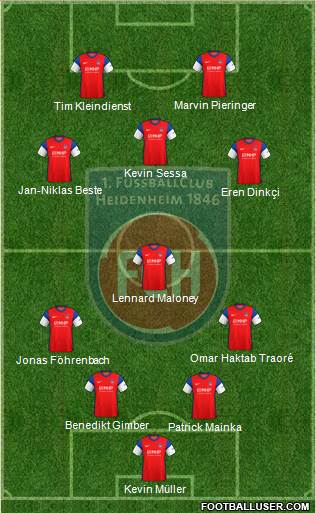
Schmidt again came up with a solid tactical plan against a heavily favored opponent. Jan Schöppner was benched for the first time in the current Rück-runde so as to facilitate the formation of a two-striker set consisting of Tim Kleindienst and Marvin Pieringer. The pairing - buttressed well by rising performer Kevin Sessa - did manage to cause problems for Rose's back-four. A disciplined press from Sessa, Jan-Niklas Beste, and Eren Dinkçi forced a lot of early mistakes out of the RB defense. Unfortunately, Sessa wasn't able to capitalize and give his team the lead.
Heidenheim might have taken all three points here were it not for an early second-half injury that forced off midfield metronome Lennard Maloney. As usual, the German-American pulled the strings beautifully from his solo axis. Perhaps the league's second-best coverage midfielder behind Granit Xhaka again racked tore up almost every blade of grass on the pitch. Schöppner did his level best as a plug-in replacement for Maloney, going so far as to garner an assist on Nicola Dovedan's equalizer. Maloney's loss nevertheless definitely influenced the final outcome.
Are Leipzig really UCL ready?
Steady improvement all across Rose's 4-2-2-2 remains undeniable. Fullbacks David Raum and Benjamin Henrichs have both taken strides back to their previous levels in recent weeks. Castello Lukeba - though he didn't have a particularly good match this time out - has largely established himself as a steady partner for Willi Obran. In midfield, Amadou Haidara parlayed his fine form from the Africa Cup of Nations into a regular starting role alongside Xaver Schlager. The duo definitely appear on the same page. It naturally helps to have a healthy Dani Olmo back working with Xavi Simons on the axis above.
At this juncture, most German football watchers must admit that criticism of Loïs Openda's finishing skills needs to be placed on the back burner. The Belgian has scored 11 goals and picked up two assists in the last 12 fixtures. Striking partner Benjamin Sesko's production numbers (seven goals and two assists) are equally impressive. Pretty much everything comes together at precisely the right time for this team. Smooth as butter. Definitely not something on the malodorous order of "Buttersäure". Leipzig probably should be considered the favorites against Dortmund.
Anything of interest from Rose?
Tactics-heads always keep a close eye on the 4-2-2-2 in hopes of occasionally seeing something different from the RB trainer. This time around, Rose - keeping an eye on the overhead from his place in the stinking stands whilst serving a touchline ban - was so kind as to give us something different to look at late on. The late match reformat also played a role in Openda's eventual game-winner. There's even more cause to back Leipzig after watching Rose make the right adjustments in his team's latest win.
Lineup—RBL—80th minute (3-3-4)
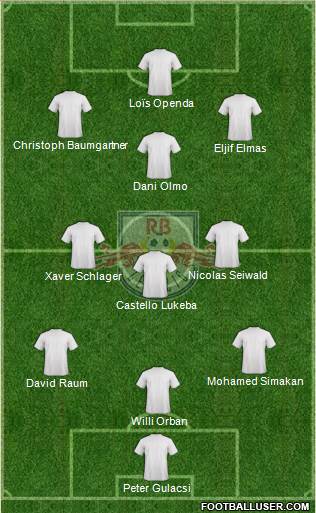
Schlager directly hit the overlapping Mohamed Simakan on the 85th-minute 2-1. The clever idea to move Lukeba into midfield drew coverage in a vital manner. Mohamed Simakan and David Raum also worked many useful over and underlaps in the final minutes. Rose's plan to integrate Ejif Elmas into late-match reformats seems to bring the best out of the young North Macedonian. Many things presently run in the right direction for this team. To all of this one might add that Peter Gulacsi has been fabulous since Janis Blaswich's injury accorded him the chance to reclaim his spot.
Leipzig's form transcends the stench the Heidenheim fans attempted to taint it with. For all the squad's struggles this season, it now appears as if Rose's ideas click into place at exactly the right time. Although German football lovers don't wish to hear it, a club they regularly register discontent with is poised to succeed in spite of their dislike of it. Perhaps the old adage of the useless of finger-pointing applies here. The "Buttersäure" gets thrown back in our face. Poorly thought out actions only end up hurting the initiator. One wagging finger turns into three facing back the other way.
"imponieren"
Time to shift gears toward something more positive. Bayern München, Borussia Dortmund, and Bayer 04 Leverkusen all remain alive in European club competitions following wins against genuine European giants last week. We'll cover the marvelously cool developments surrounding this trio in the final section via a check-in with a sensationally cool German word the columnist is so very pleased to see once again making the rounds. When it comes time to declare oneself impressed with something, the German language offers the speaker/writer a whole confluence of options.
Most Germans opt for the verb/adjective "beeindruckt/beeindrucken". The combo "aufgeprägt/aufprägen" constitutes the second most popular choice with the closely related "einprägen/eingeprägt" serving as a close third. One doesn't often hear "imponiert/imponieren" invoked as its much farther down the list. Discursive references to the three teams we're about to discuss nevertheless saw it pop up quite a bit in recent days. The author couldn't possibly be more pleased. Germans often worry about the reduction of our language. We fear variety being lost.
No need for an etymology lesson this week as the origins of the word "to impress" should be abundantly clear. The word obviously evolved from the literal act of embossing an imprint on something. Germans take pride in the fact that the most historically significant example of this deed belongs to Mainz's Johannes Gutenberg. The invention that influenced our species more than any other sprung from our country. Where would humanity be without the "impression" of movable type? The indentations of the printing press moved us out of the Dark Ages.
It is such that the German language contains more synonyms for "to be impressed" than any other lingua. It's our word. As is the case with just about any language these days, however, a diverse range of linguistic options frequently gets eschewed in the interest of more simplistic clarity. The columnist doesn't wish to suggest that this hasn't always been the case. Simple communication has always been necessitous. Words have fallen into disuse and ultimately been discarded every since Stone Age Man began uttering sounds.
There's merely a slight grievance to broach in this case. Does every writer not find themselves perturbed when modern word processing engines "flag" a composition for "having complex vocabulary potentially not suited for a larger audience"? Grumble, grumble. What purpose does a tendency towards some sort of Orwellian "New Speak" truly serve? Isn't the impetus to reach, expand, transform, and challenge the core purpose of all creative content? Tough questions. We'll leave them unanswered for now and get to the football.
How are Bayern impressing?
Thomas Tuchel's strength as a tactician were never really in question. His insistence on club management acquiring a "holding six" for him led to some popular discontent, but the high-profile trainer's ability to adapt players to his own brand of tactics was easily the most important factor leading to his success at other stations. As one begins to ponder the post-Tuchel Era at Bayern, thoughts of what might have been begin to creep in. If Tuchel had only stuck to his primary strength and kept his mouth shut...
Lineup—FCB—UCL (4-2-3-1)
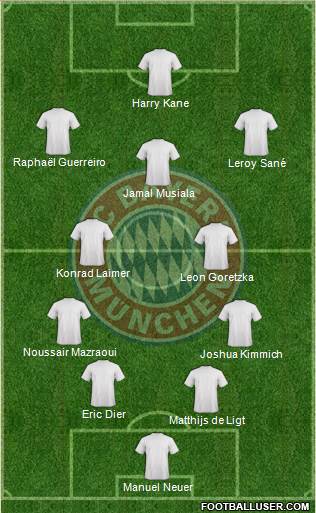
The entire left-hand side performed well in the Champions' League win over Arsenal. The graphic aims to underline how many players worked out of position. Raphaël Gurreiro - while experienced enough as a midfielder - never played as a straight winger. Noussair Mazaraoui had zero club experience as a left back until last week. Konrad Laimer ordinary serves on the right midfield slant. Match hero Joshua Kimmich routinely failed to find the motivation to thrive whenever moved back to his old right-back role...until he served under this particular head-coach.
How did Tuchel preserve the lead late?
Simply stated, by pulling off a "tactical masterclass". When Min-Jae Kim replaced Mazraoui late, a well-designed defensive formation kept the Gunners at bay. Leon Goretzka slid back to spearhead a tightly-packed back four. Guerreiro moved three axes back in order to help guard the box. Laimer operated on a solo axis to help facilitate counter opportunities. Tuchel's plan for closing out the match was impressive indeed. The soon-to-be unemployed trainer leaves an imprint on all of us "tactics-nerds". He truly does know what he's doing.
Lineup—FCB—77th minute (6-3-1)
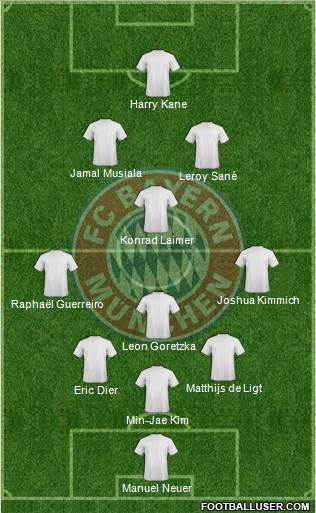
The columnist declares himself "imponiert".
How did Tuchel orchestrate the league win?
Again, by getting players properly prepared to play out of position. The author has honestly never seen Eric Maxim Choupo-Moting work the left flank. Mathys Tel - when not serving as a striker - generally works on the left himself. Tuchel properly assessed that a slumping Alphonso Davies would render the left his weakest side and adjusted accordingly. Everyone performed well in a midfield version of the 4-2-3-1 that slammed 1. FC Union Berlin on Saturday evening. Max Eberl and the FCB front-office may wish to consider retaining their coach after all.
Lineup—FCB—Match 30 (4-2-3-1)
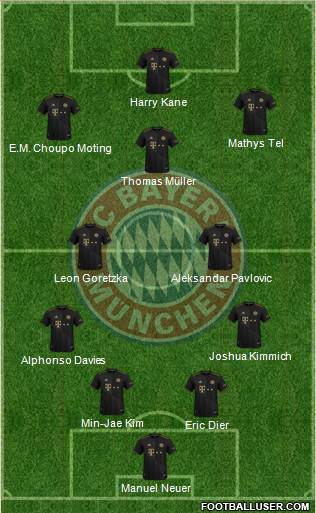
The columnist declares himself "eingeprägt"!
How much more impressive is Xabi?
Impressive enough to warrant continued predictions that Leverkusen will achieve their undefeated season. The Bundesliga's best trainer keeps upholding his reputation as a leader with a plan for every last occasion. The cagey draw that enabled Germany's red company team to advance in the Europa League called for pragmatism. Alonso wisely put together something conservative to scrape by in Thursday's European tie, neatly prioritizing the upcoming league fixture against Dortmund. Regardless if entertainment value dipped, this got the job done.
Lineup—B04—UEL (4-5-1)
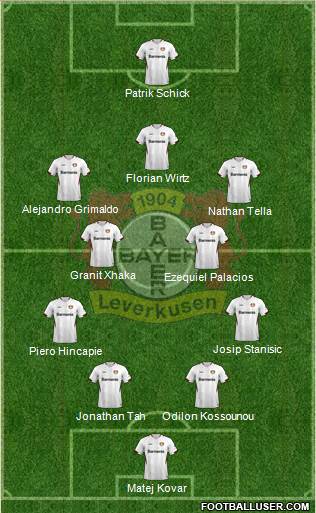
The columnist declares himself "aufgeprägt"!
How did Xabi manage the Dortmund draw?
More pragmatism was unexpectedly called for when neither Victor Boniface nor Patrik Schick - both carrying knocks - were available for the starting XI. Xabi devised an elegant solution. Jonas Hofmann worked as a deeply pocketed false nine whilst Nathan Tella returned to his natural position. Josip Stanisic worked higher up behind Jeremie Frimpong to keep the right flank moving. Granit Xhaka and Robert Andrich kept a strict horizontal chain ahead of a flat back-three. This too, again at the expense of some entertainment value, got the job done.
Lineup—B04—Match 30 (3-4-3)
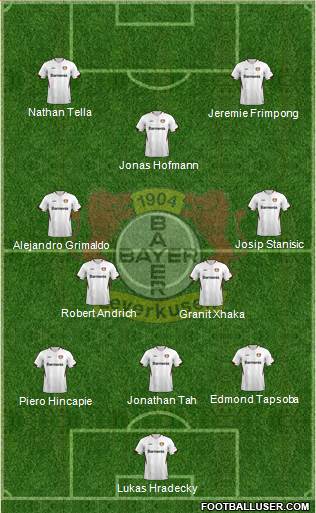
A late goal from Niclas Füllkrug threatened to send Leverkusen to their first loss of the season. Those watching the big Sunday showdown nevertheless maintained little doubt that a late equalizer would be in the cards. Josip Stanisic's 1-1 at 90+7, in fairness, came off a dead-ball. That still doesn't change the fact that Xabi's late tactical reformat helped the team maintain belief and played an important role in winning the corner in the first place. Xhaka, Jonathan Tah, and Florian Wirtz all made the most of their new positioning.
Lineup—B04—84th minute (4-3-3)
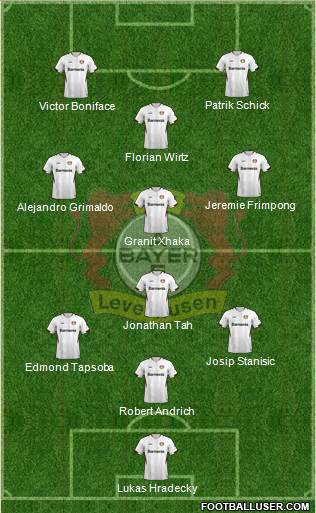
Xabi exhibits a deep understanding of both football and his team. The dramatic late equalizer began with an effective rush from open play. Leverkusen's Spanish set-piece specialist Alejandro Grimaldo won the corner with a great free-kick. Wirtz's delivery on the corner was divine. When one considers just how thoroughly prepared this squad is week in and week out, it becomes impossible not to see it all wrapping up with an undefeated season and three gleaming trophies gracing the Bay Arena on May 26th.
Is there a word above "impressed"?
Germans sometimes speak of being "beseelt"
Sometimes admiration "touches the soul".
Thanks so much for reading! You can catch the release of all Peter's columns (and occasionally catch him goofing off) on whatever the hell they're calling twitter these days @PeterVicey.
Twitter DMs are open for football conversations, corrections, and (if you truly insist) general abuse.
Full color re-posts of the columns are eventually archived on Peter's website.